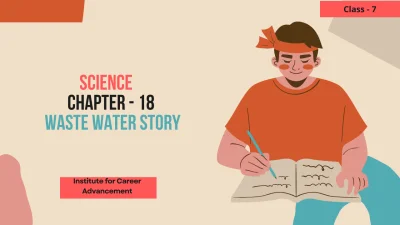| Short description |
Wastewater refers to water that has been used and contaminated through various human activities, such as domestic, industrial, agricultural, and commercial processes. It typically contains pollutants, organic matter, pathogens, and chemicals that require treatment before being released back into the environment or reused.
বর্জ্য জল এমন জলকে বোঝায় যা বিভিন্ন মানবিক ক্রিয়াকলাপ যেমন গার্হস্থ্য, শিল্প, কৃষি এবং বাণিজ্যিক প্রক্রিয়ার মাধ্যমে ব্যবহৃত এবং দূষিত হয়েছে। এটিতে সাধারণত দূষক, জৈব পদার্থ, প্যাথোজেন এবং রাসায়নিক পদার্থ থাকে যা পরিবেশে ছেড়ে দেওয়ার আগে বা পুনরায় ব্যবহার করার আগে চিকিত্সার প্রয়োজন হয়। |
|
|
| Outcomes |
- Here are the expected outcomes for students: Understanding Wastewater and Its Sources: Students will comprehend the concept of wastewater and identify its sources, including domestic, industrial, commercial, and agricultural activities. They will recognize the various pollutants present in wastewater and understand how these pollutants can impact water quality and ecosystems. Knowledge of Wastewater Treatment Processes: Students will learn about the stages of wastewater treatment, including preliminary treatment (screening, grit removal), primary treatment (sedimentation), secondary treatment (biological processes), and tertiary treatment (filtration, disinfection). They will understand the purpose of each treatment stage in removing contaminants and pathogens to make wastewater safe for discharge or reuse. Environmental and Public Health Impacts: Students will explore the environmental and public health consequences of untreated wastewater, including water pollution, ecosystem degradation, and risks to human health from waterborne diseases. They will understand the importance of effective wastewater management in protecting water resources and maintaining environmental sustainability. Role of Wastewater Management in Sustainable Development: Students will understand how wastewater management contributes to sustainable development goals, such as clean water and sanitation (SDG 6), by improving water quality, conserving water resources, and supporting ecosystem health. They will explore the link between wastewater management, public health outcomes, and community well-being. Technological and Innovation Awareness: Students will be introduced to innovative technologies and solutions in wastewater treatment, such as membrane filtration, advanced oxidation processes, and decentralized treatment systems. They will appreciate the role of technology in improving wastewater treatment efficiency, reducing environmental impact, and enhancing resource recovery from wastewater. Community Engagement and Responsibility: Students will recognize their role and responsibility in promoting responsible water use, reducing wastewater generation, and supporting infrastructure improvements for wastewater treatment. They will explore ways to advocate for sustainable wastewater management practices in their communities and beyond. Interdisciplinary Connections: Students will understand the interdisciplinary nature of wastewater management, integrating concepts from science (biology, chemistry), technology (engineering, innovation), social studies (policy, governance), and environmental studies. They will develop critical thinking skills to analyze complex issues related to wastewater management and explore solutions from multiple perspectives.
- এখানে শিক্ষার্থীদের জন্য প্রত্যাশিত ফলাফল রয়েছে: বর্জ্য জল এবং এর উত্স বোঝা: শিক্ষার্থীরা বর্জ্য জলের ধারণাটি বুঝতে পারবে এবং এর উত্সগুলি সনাক্ত করবে, যার মধ্যে গার্হস্থ্য, শিল্প, বাণিজ্যিক, এবং কৃষি কার্যক্রম রয়েছে। তারা বর্জ্য জলে উপস্থিত বিভিন্ন দূষণকারীকে চিনবে এবং বুঝতে পারবে কীভাবে এই দূষণগুলি জলের গুণমান এবং বাস্তুতন্ত্রকে প্রভাবিত করতে পারে। বর্জ্য জল শোধন প্রক্রিয়ার জ্ঞান: শিক্ষার্থীরা প্রাথমিক চিকিত্সা (স্ক্রিনিং, গ্রিট অপসারণ), প্রাথমিক চিকিত্সা (অবক্ষেপণ), মাধ্যমিক চিকিত্সা (জৈবিক প্রক্রিয়া), এবং তৃতীয় চিকিত্সা (পরিস্রাবণ, জীবাণুমুক্তকরণ) সহ বর্জ্য জল চিকিত্সার ধাপগুলি সম্পর্কে শিখবে। তারা দূষিত পদার্থ এবং রোগজীবাণু অপসারণের প্রতিটি চিকিত্সা পর্যায়ের উদ্দেশ্য বুঝতে পারবে যাতে বর্জ্য জল নিষ্কাশন বা পুনঃব্যবহারের জন্য নিরাপদ হয়। পরিবেশ ও জনস্বাস্থ্যের প্রভাব: শিক্ষার্থীরা অপরিশোধিত বর্জ্য জলের পরিবেশগত এবং জনস্বাস্থ্যের পরিণতিগুলি অন্বেষণ করবে, যার মধ্যে জল দূষণ, বাস্তুতন্ত্রের অবক্ষয় এবং জলবাহিত রোগ থেকে মানব স্বাস্থ্যের ঝুঁকি রয়েছে৷ তারা জল সম্পদ রক্ষা এবং পরিবেশগত স্থায়িত্ব বজায় রাখার জন্য কার্যকর বর্জ্য জল ব্যবস্থাপনার গুরুত্ব বুঝতে পারবে। টেকসই উন্নয়নে বর্জ্য জল ব্যবস্থাপনার ভূমিকা: শিক্ষার্থীরা বুঝতে পারবে কীভাবে বর্জ্য জল ব্যবস্থাপনা টেকসই উন্নয়ন লক্ষ্যে অবদান রাখে, যেমন পরিষ্কার জল এবং স্যানিটেশন (SDG 6), জলের গুণমান উন্নত করে, জলের সম্পদ সংরক্ষণ করে এবং বাস্তুতন্ত্রের স্বাস্থ্যকে সমর্থন করে৷ তারা বর্জ্য জল ব্যবস্থাপনা, জনস্বাস্থ্যের ফলাফল এবং সম্প্রদায়ের কল্যাণের মধ্যে লিঙ্কটি অন্বেষণ করবে। প্রযুক্তিগত এবং উদ্ভাবন সচেতনতা: শিক্ষার্থীদের বর্জ্য জল চিকিত্সার ক্ষেত্রে উদ্ভাবনী প্রযুক্তি এবং সমাধানগুলির সাথে পরিচয় করিয়ে দেওয়া হবে, যেমন ঝিল্লি পরিস্রাবণ, উন্নত জারণ প্রক্রিয়া এবং বিকেন্দ্রীভূত চিকিত্সা ব্যবস্থা। তারা বর্জ্য জল চিকিত্সা দক্ষতা উন্নত করতে, পরিবেশগত প্রভাব হ্রাস এবং বর্জ্য জল থেকে সম্পদ পুনরুদ্ধার বাড়ানোর ক্ষেত্রে প্রযুক্তির ভূমিকার প্রশংসা করবে। সম্প্রদায়ের নিযুক্তি এবং দায়িত্ব: শিক্ষার্থীরা দায়িত্বশীল জলের ব্যবহার প্রচার, বর্জ্য জল উত্পাদন হ্রাস এবং বর্জ্য জল চিকিত্সার জন্য অবকাঠামোগত উন্নতিতে সহায়তা করার ক্ষেত্রে তাদের ভূমিকা এবং দায়িত্ব স্বীকার করবে। তারা তাদের সম্প্রদায় এবং এর বাইরেও টেকসই বর্জ্য জল ব্যবস্থাপনা অনুশীলনের জন্য সমর্থন করার উপায়গুলি অন্বেষণ করবে। আন্তঃবিভাগীয় সংযোগ: শিক্ষার্থীরা বর্জ্য জল ব্যবস্থাপনার আন্তঃবিভাগীয় প্রকৃতি বুঝতে পারবে, বিজ্ঞান (জীববিজ্ঞান, রসায়ন), প্রযুক্তি (প্রকৌশল, উদ্ভাবন), সামাজিক অধ্যয়ন (নীতি, শাসন), এবং পরিবেশগত অধ্যয়নের ধারণাগুলিকে একীভূত করবে। তারা বর্জ্য জল ব্যবস্থাপনা সম্পর্কিত জটিল সমস্যাগুলি বিশ্লেষণ করতে এবং একাধিক দৃষ্টিকোণ থেকে সমাধানগুলি অন্বেষণ করতে সমালোচনামূলক চিন্তার দক্ষতা বিকাশ করবে।
|
|
|
| Requirements |
- Wastewater contains valuable water resources that, when treated properly, can be reused for various purposes such as irrigation, industrial processes, and non-potable water needs. Understanding wastewater helps in conserving and efficiently managing water resources, especially in regions facing water scarcity. Education about wastewater fosters awareness among communities and individuals about the importance of water conservation, pollution prevention, and environmental stewardship. It empowers individuals to make informed decisions and take actions that contribute to sustainable development and a healthier environment.
- বর্জ্য জলে মূল্যবান জলের সম্পদ রয়েছে যা সঠিকভাবে শোধন করা হলে, সেচ, শিল্প প্রক্রিয়া এবং অ-পানীয় জলের প্রয়োজনের মতো বিভিন্ন উদ্দেশ্যে পুনরায় ব্যবহার করা যেতে পারে। বর্জ্য পানি বোঝা পানির সম্পদ সংরক্ষণ এবং দক্ষতার সাথে পরিচালনা করতে সাহায্য করে, বিশেষ করে পানির ঘাটতির সম্মুখীন অঞ্চলে। বর্জ্য জল সম্পর্কে শিক্ষা সম্প্রদায় এবং ব্যক্তিদের মধ্যে জল সংরক্ষণের গুরুত্ব, দূষণ প্রতিরোধ এবং পরিবেশগত দায়িত্ব সম্পর্কে সচেতনতা বৃদ্ধি করে। এটি ব্যক্তিদের সচেতন সিদ্ধান্ত নিতে এবং টেকসই উন্নয়ন এবং একটি স্বাস্থ্যকর পরিবেশে অবদান রাখে এমন পদক্ষেপ নেওয়ার ক্ষমতা দেয়।
|
|
|


 0
0 